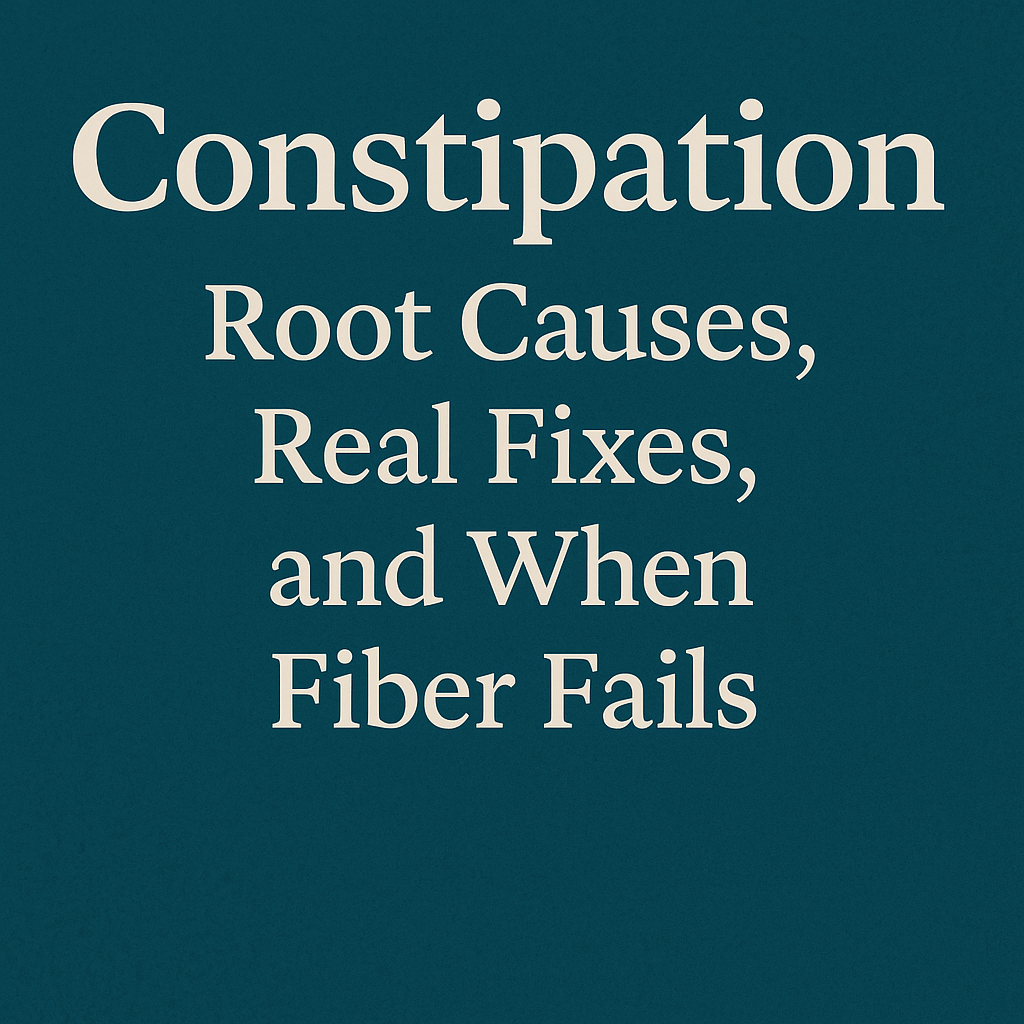The Hidden Science of Constipation: Why “Just Eat More Fiber” Fails — And What to Do Instead

What we’ll cover
- Caught in the Traffic Jam: The Hidden Struggle of Chronic Constipation
- Why Conventional Wisdom Falls Short
- A Deeper Functional Medicine Explanation
- Key Questions That Should Be Asked
- Common Hidden Root Causes
- Case Study
- Why Conventional Care Misses It
- The Functional Medicine Lens
- Why This Matters: Hope & Stakes
Caught in the Traffic Jam: The Hidden Struggle of Chronic Constipation
From a functional medicine standpoint, chronic constipation often hides deeper biological and emotional mechanisms—and until you address those, you’ll struggle to restore true digestive rhythm.
Imagine waking each morning with a tight, bloated belly. You feel the fullness pressing in, yet when you head to the bathroom, nothing moves. You sit. You strain. You scroll your phone. Time passes. You push. You hope. But what comes out is small, hard, dry, incomplete. You feel sluggish, foggy, and irritable. You know you should “just” poop more easily—but it doesn’t happen. You decline social events, feeling uncomfortable in your own body. You drink more water. Eat more fibre. Go for walks. Yet the cycle repeats.
That is the lived reality of someone trapped in chronic constipation.
Why Conventional Wisdom Falls Short
You’ve probably heard: “Eat more fibre. Drink more fluids. Get more exercise.” Sure—they are useful suggestions. But they are simplistic, because they treat constipation like a mechanical slowdown—a “slow bowel”—and ignore deeper drivers:
- The gut may not be moving properly (motility issues)
- Nerve or hormonal signals may be impaired
- The gut microbiome may be disrupted
- The stool may be hard because of excessive fluid absorption
In short: telling someone to just have more bran is like telling a car with a broken transmission to “drive slower”—it doesn’t fix the engine. Evidence shows that constipation is not simply a matter of low fibre intake. Standard advice often misses root-mechanisms: motility, nerve signalling, microbiome health, toxin/hormone dysregulation, and more. Without addressing those, adding fibre may help temporarily—but the problem often returns.
A Deeper Functional Medicine Explanation
To truly understand why constipation persists despite more fibre and fluids, we need to look beneath the surface into how the gut, brain, hormones and microbiome work together as an integrated system.
Gut Motility & Transit Time
The colon receives about 1.5 litres of liquid effluent every day from the small intestine, absorbs fluid, and transports waste. In constipation, transit is delayed—so stool sits too long, more water is reabsorbed, making it hard, dry and difficult to pass. Think of your colon as a conveyor belt: when that belt slows, the product sits too long and dries out. The goal isn’t just “go more often”—but to restore your body’s natural rhythm so movement happens easily and comfortably again.
Fluid & Electrolyte Handling
It’s more than fibre. Ion-channels, aquaporins, the enteric nervous system (the gut’s “mini-brain”) that controls movement, the microbiota and endocrine signals all regulate how fluid moves and how the colon handles stool. When these are disrupted, stool becomes dry and tough. In everyday terms: your colon has its own intelligent system that sets how much water to pull from or push into stool—like adjusting moisture in dough. When the system is out of balance, the colon may pull out too much water, leaving the stool dry and hard. Supporting your gut’s natural hydration and nerve-signalling helps restore that balance, allowing the bowel to move smoothly again.
Microbiome & Gut Ecology
People with functional constipation often show microbial dysbiosis—fewer beneficial bacteria (like Bifidobacteria), altered mucosal species, and reduced short-chain fatty acid production that weakens motility. In everyday language: your gut is home to trillions of bacteria that help keep things moving. If the “helper” microbes are reduced, the colon loses some of its natural movement signals. These bacteria also produce short‐chain fatty acids which keep the gut lining healthy and the muscles active. Restoring a balanced microbiome via food, lifestyle and targeted probiotics can reignite your gut’s natural rhythm.
Nerve, Hormone, Toxin & Inflammation Signals
The enteric nervous system, autonomic tone and hormonal axes (thyroid, serotonin, cortisol) directly shape bowel function. Low-grade inflammation or toxin burden may blunt nerve signalling, dulling the “urge to defecate.” In everyday terms: your gut and brain are in constant communication. Hormones and nerve signals act like traffic lights telling your colon when to move. When stress, toxins or inflammation interfere, those signals get jammed and the normal urge to go can fade. Supporting healthy hormone balance, calming the nervous system and reducing toxin load can help restore those signals—allowing the gut to regain its natural flow and rhythm.
Lifestyle, Stress, Habits & Mind–Body
Of course, the most sophisticated physiology can’t function properly when lifestyle patterns keep the body locked in stress or immobility. High stress, poor sleep, sedentary behaviour and ignoring natural urges compound autonomic imbalance and slow gut transit. In functional medicine language: constipation is a systemic signal—not just a “lazy colon,” but a body saying, “something upstream isn’t moving.” In everyday terms: your body’s rhythm depends on more than food—it depends on your whole lifestyle. When you’re under constant stress, not sleeping well, sitting too much or ignoring your body’s signals, your “rest and digest” system slows down. Constipation is your body’s way of saying the whole system—not just your gut—needs to move and relax again.
Key Questions That Should Be Asked
A skilled functional-medicine clinician will ask far more than “How many bowel movements per week?” or “Do you use laxatives?”
Constipation is not a one-dimensional problem, and neither should the questioning be. Each case tells a story—often involving triggers, biochemical imbalances, lifestyle patterns and neuro-hormonal signals that conventional approaches overlook. Here are just a few of the deeper questions that begin to uncover root-causes:
- When did the constipation begin and was there a triggering event (surgery, infection, medication, stress)?
- What is the stool consistency (hard/lumpy, pellet-like, thin or scant, sense of incomplete evacuation)?
- What is your gut-microbiome history (e.g., antibiotics, gut infections, H. pylori, food poisoning)?
- What medications/nutrient depletions do you have (opioids, anticholinergics, calcium/iron supplements, magnesium deficiency)?
- What is your sleep, stress and circadian rhythm like (since motility ties into autonomic balance)?
- What is your diet like beyond fibre (types of fibre, fermentation, gas, FODMAPs, fermentation intolerance)?
- What is your microbiome health (history of constipation or IBS, probiotics use, pre-biotic diet, fermented foods)?
These few questions barely scratch the surface. In a comprehensive Functional Medicine assessment, there may be over 60-80 targeted questions spanning gastrointestinal function, neuro-endocrine regulation, detoxification pathways, nutrient biochemistry, stress patterns and behavioural influences.
Common Hidden Root Causes
Once the right questions are asked, the underlying patterns begin to reveal themselves—often pointing toward a few common biological culprits. Here are three major drivers that frequently keep patients stuck:
- Sluggish colon movement caused by weakened nerve & muscle coordination – In slow-transit constipation the colon moves too slowly due to fewer pacemaker cells and less excitatory signalling.
In everyday terms: your colon has its own built-in rhythm makers—tiny “pacemaker” cells and nerves that help coordinate movement. When these signals weaken or go off-beat, the colon slows down, and stool doesn’t move forward as it should. Supporting the nerves, muscles and overall energy of the gut helps restore this rhythm so that movement feels natural again. - Gut microbiome dysbiosis – Altered microbial populations reduce production of short-chain fatty acids and other metabolites that promote motility and normal stool water content.
In everyday terms: your gut is like a living ecosystem filled with microbes that keep everything moving smoothly. When the balance of these microbes is disturbed—often via stress, antibiotics or poor diet—the gut loses some of its natural “fuel” for movement. The result can be sluggish digestion and harder stools. Restoring a healthy microbial balance helps the gut regain its natural flow and rhythm. - Autonomic nervous system imbalance + pelvic-floor dysfunction – Stress, sedentary lifestyle, ignoring the urge, and muscle/pelvic-floor coordination problems lead to impaired defecation mechanics (outlet dysfunction).
In everyday terms: your body’s “automatic” nervous system controls so many behind-the-scenes functions—like heart rate, digestion, bowel movement. When chronic stress or tension keeps this system on high alert, it can tighten the muscles that should actually relax during a bowel movement. Over time, those muscles forget how to coordinate properly. Re-learning how to relax the pelvic floor, move regularly and reduce stress helps the body remember its natural release rhythm—allowing the process to feel easy and complete again.
Case Study
Meet “Sally”, a 52-year-old teacher who had battled chronic constipation for eight years. She reported just 2-3 stools per week, hard lumps, frequent straining, a sense of incomplete emptying and persistent bloating. She had tried high-fibre cereals, prune juice, and occasional laxatives. Her gastroenterologist ruled out obstruction, performed a colonoscopy (normal) and offered standard advice—but nothing changed.
During her functional-medicine consultation, she explored deeper questions. She had been on chronic low-dose opioids for back pain following a car accident ten years earlier. She had a history of repeated antibiotic use in her 20s for sinus infections. She lived with high chronic stress and averaged only five hours of sleep each night. A comprehensive gut panel revealed reduced Bifidobacteria and low motility biomarkers. A pelvic-floor physical-therapy evaluation showed dyssynergic defecation—her pelvic muscles were contracting rather than relaxing when attempting to pass stool.
Intervention: Sally gradually discontinued opioid therapy (with pain-management support) and began a microbiome-restoration protocol including prebiotics, probiotics and fermented foods. Nutritional optimisation targeted magnesium, B12 and vitamin D. She added daily movement (10-minute morning walk), adopted a “squatty-potty” posture for bowel movements, began pelvic-floor biofeedback therapy to retrain her defecation mechanics.
Within six weeks, Julia reported one stool per day, easier passage, less bloating and reduced straining—along with a profound sense of ease, as though the “traffic jam” in her colon had finally cleared.
This case illustrates how identifying and addressing hidden root causes leads to meaningful breakthroughs—not just “more fibre.”
Why Conventional Care Misses It
In conventional care, patients often get a 10-15 minute appointment, a “normal” basic lab panel (CBC, TSH – maybe a few electrolytes), and the familiar advice:
“Increase fibre, drink more water, maybe try an over-the-counter laxative.”
If that fails, a colonoscopy is ordered to rule out structural issues, followed by the label “functional constipation” and a prescription for a generic medication.
But this model misses the deeper story—the real upstream mechanisms driving dysfunction:
- Nerve signalling, microbiome imbalance, toxin exposure, and autonomic dysregulation
- Subtle lab abnormalities such as magnesium deficiency, low-grade inflammation and oxidative stress that are not captured on a standard panel
- Movement, postural and pelvic-floor mechanics that require targeted physical-therapy intervention rather than more medication
- The integrative view of the gut–brain–body connection, recognising constipation as a systemic signal, not merely a laxative shortfall
As a result, symptom suppression becomes the default—providing short-term relief but leaving root causes unresolved. The pattern repeats. Patients remain trapped in the chronic cycle of discomfort and frustration.
The Functional Medicine Lens
From a functional medicine perspective, constipation is not a defect or a simple disorder of the colon—it’s a signal that something within the system is misaligned. It’s the body waving a red flag: “I’m stuck. I’m not moving as I should.” In this paradigm, we shift the lens from suppression to discovery—asking why things are happening instead of merely what is happening. We ask:
- Why is the stool hard?
- Why is transit slow?
- Why is neural signalling impaired?
We investigate beyond the colon: the enteric nervous system (ENS), microbiome, endocrine signals, autonomic balance, toxin exposure, nutrient status, and lifestyle factors are all under review. We treat the person, not the symptom. By restoring motility, retraining mechanics, optimising the microbiome, balancing hormones and resolving stress and autonomic dysregulation, we create systemic harmony rather than chasing stool frequency alone.
We view the gut as a dynamic network: the gut–brain axis, gut–immune axis and gut-microbiome axis are interdependent systems that collectively determine motility, inflammation and metabolic balance. In practice, this means we don’t stop at fibre or laxatives. Instead we explore motility testing, microbiome labs, pelvic-floor evaluation, autonomic screening, environmental toxin assessment and personalised nutritional strategies. When you heal the upstream causes, the downstream symptom—constipation—often resolves naturally.
Why This Matters: Hope & Stakes
Stakes
Ignoring persistent constipation is more than just an annoyance. It’s linked to:
- Decreased quality of life
- Increased healthcare costs
- Complications such as hemorrhoids, anal fissures, faecal impaction, colonic dysmotility and pelvic-floor damage
- Possibly an increased risk of broader dysfunction across the gut–brain–immune networks
In short, chronic constipation isn’t just inconvenient—it’s a biological signal of systemic imbalance that deserves thorough, root-cause attention.
Hope
The great news is that constipation can be reversed—not merely managed—when the root causes are addressed. The story of Julia above illustrates that turnaround. With a functional medicine approach, the cycle of frustration,straing and discomfort can finally come to an end. You no longer have to live in “slow mode.” You can move into ease, comfort, regularity and freedom—regaining your sense of control, your digestive rhythm—and ultimately, your vitality.


